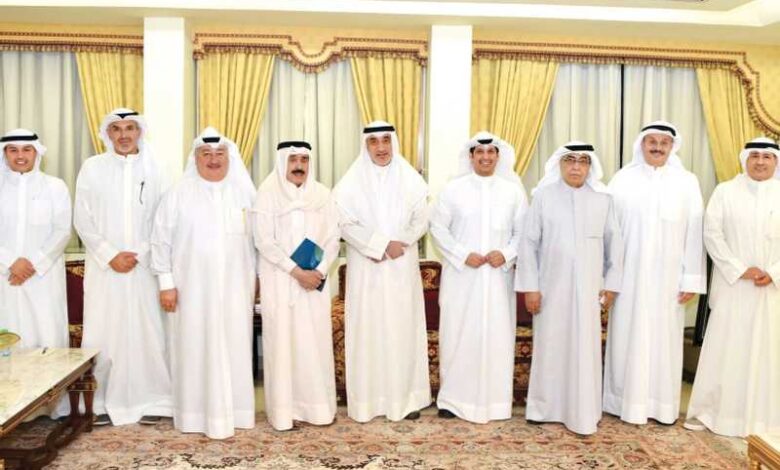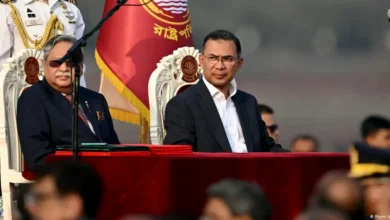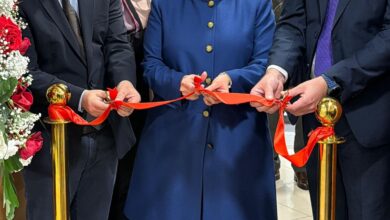Era of manipulation is done and dusted; law applies to all without discrimination: Al-Yousef
First Deputy Prime Minister and Minister of Interior highlights citizenship fraud and new legal framework for illegal residents; comprehensive war on drugs and smuggling; tourism, media partnerships, and public engagement

First Deputy Prime Minister and Minister of Interior Sheikh Fahad Al-Yousef reaffirmed the government’s determination to press ahead with reform measures, stressing that the law applies equally to all saying “the era of manipulation is over.”
Speaking during a meeting with editors-in-chief of local newspapers, which was also attended by Minister of Information and Culture and Minister of State for Youth Affairs Abdulrahman Al-Mutairi and the Chairman of the Kuwait Journalists Association, Al-Yousef said Kuwait is burdened with a heavy legacy of challenges resulting from nearly four decades of mistakes by some members of the National Assembly and the negligence of ministers in past governments.
He noted that the Ministry of Interior is working under the guidance of the political leadership to strengthen security and stability, describing security as the cornerstone of the development process.
The discussions also touched on national identity, with Al-Yousef underscoring its importance in fostering belonging and reinforcing the values of citizenship.
He stressed that the state is committed to preserving identity across media, cultural, and social platforms. At the same time, he urged patience, saying that what was damaged over forty years cannot be repaired in one or two.
“In Kuwait, no one is wronged, and the law is applied uniformly,” he added, recalling past practices where accused individuals could walk out of police stations through a “back door” without accountability. That, he emphasized, has now ended, as every case is subject to due legal process.
Addressing the sensitive issue of citizenship fraud, Al-Yousef revealed that cases of forgery and manipulation were more widespread than previously thought, with some instances producing dozens of fraudulent registrations.
He explained that the revocation of citizenship under Article 8 was legally sound, as confirmed by seven constitutional experts. Revocation began with those who had obtained citizenship in 1987, when it was granted by decree.
He further announced that a draft law addressing the status of illegal residents is in its final stages. The law will ensure their continued legal stay in Kuwait with their families, while countries have expressed willingness to grant them alternative citizenship.
He warned, however, that anyone who fails to regularize their situation within the set timeframe will be classified as a refugee or displaced person.
So far, 425 illegal residents have disclosed their true nationalities and regularized their status, gaining significant privileges. Al-Yousef revealed that around 65,000 passports were issued for tourism purposes to this group, though student and medical passports remain valid.
He highlighted cases of sham marriages followed by quick divorces used as a pathway to citizenship and said most fraudulent cases were tied to electoral interests and some lawmakers. Revocations also covered pre-1987 cases where recipients were found to be living abroad.
He pointed out that violations in the citizenship file intensified after the Iraqi invasion, with 2005 witnessing the highest percentage of naturalizations — nearly 40 percent of the total.
He admitted he had analyzed this unusual spike but could not identify the reason. Despite revocations, those who lost citizenship still enjoy many rights under Article 5, including continued state-funded education for their children at all levels and uninterrupted scholarships.
Around 700 people were naturalized in 2005 for “noble deeds,” though Al-Yousef questioned the absence of clear criteria for such cases, while affirming that the citizenship of martyrs who performed noble deeds will never be revoked.
On the fight against drugs, Al-Yousef described the government’s efforts as a “comprehensive war” to eliminate the scourge and dry up its sources. He said the Ministry of Interior has largely eliminated maritime smuggling through the use of drones, reducing such cases to rare occurrences.
Security forces arrest drug dealers daily, though only major seizures are announced. Combating the problem, he stressed, requires more than arrests and includes treatment and prevention.
Two major centers are being established to treat addiction, one already secured in Sulaibiya and another being planned in Abdali or Wafra, with both to meet international standards. Recent visits to Syria and Lebanon, he added, have produced joint strategies that are already yielding daily seizures, underscoring the seriousness of Kuwait’s campaign.
The discussions also covered visa and residency policies aimed at striking a balance between facilitating tourism and investment while protecting national security. Al-Yousef affirmed that border reopening is monitored closely to ensure compliance with laws and regulations. He highlighted cooperation with the press, praising its role as a partner in raising awareness and covering national achievements.
Turning to labor issues, Al-Yousef noted that nearly 300,000 exit permits for private sector workers have been issued through simple procedures that safeguard the rights of workers, sponsors, and the state.
Meanwhile, Minister Abdulrahman Al-Mutairi announced that a major tourism campaign will launch in mid-September, coinciding with the reopening of tourist visits. The campaign will include the “Visit Kuwait” platform to facilitate visa issuance and promote the country internationally.
Responding to criticism, Al-Yousef defended the work of the Nationality Grievances Committee, insisting it is not a mere formality but a serious, impartial body reviewing files thoroughly with integrity.
He also exposed cases of fraudulent marriages carried out solely to obtain citizenship before ending in quick divorces. He announced that those stripped of nationality under Article 8 will receive blue civil cards, renewable every five years, granting them nearly all the rights of Kuwaiti women except passports.
The meeting concluded with editors-in-chief thanking Al-Yousef for the transparent dialogue and calling for regular engagement between media and government leaders. In a candid moment, Al-Yousef admitted the intensity of his responsibilities leaves him sleeping only two hours a day, but he added, “the fatigue is easy for Kuwait, which has given us so much and deserves much more from us.”
Follow The Times Kuwait on X, Instagram and Facebook for the latest news updates











